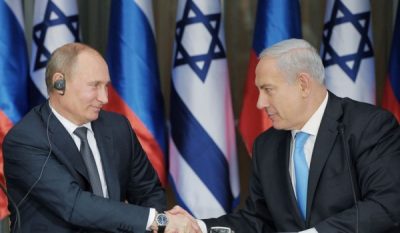The Resumption of Russia-Israel Free Trade Talks Proves “Ties Are Fantastic”. Implications for Syria?

No, Russian-“Israeli” ties aren’t in a state of “crisis” after the latter bombed Syria earlier this month, but are actually enjoying an unprecedented flourishment that won’t be offset by whatever happens in the Arab Republic, and Moscow might even tie Tel Aviv into the same multilateral free trade area that has recently expanded to include Iran.
“Israel’s” bombing of Syria earlier this month predictably prompted many in the Alt-Media to declare that this time Russia will surely ‘teach its ally a lesson’ by openly turning into the ‘anti-Zionist crusader state’ that their dogma has indoctrinated them into imagining that it’s been this entire time. They were, as is becoming the norm, totally wrong, and three specific events prove that ties between the two sides aren’t in a state of “crisis” but are rather flourishing, with the latest milestone in their relationship being the resumption of free trade talks.
First things first, it took Russia over 24 hours to summon the “Israeli” “Ambassador” after the early-April bombing of Syria, which is extremely unusual behavior if Moscow was indeed as caught off guard as it publicly proclaims to have been at the time. Ordinarily, the offended country would immediately request an official meeting with the insulting party’s top representative, especially when the incident in question had to do with an unannounced military strike that could have supposedly injured the host country’s servicemen, but this curiously wasn’t the case.
Furthermore, it took President Putin two full days to speak to Netanyahu, which is also very strange if one believes the Alt-Media narrative that Russia and “Israel” are experiencing one of their worst crises in decades. In addition, it wasn’t even the Russian side that initiated the conversation but the “Israeli” one, which again wouldn’t normally be the case if Moscow was so furious at Tel Aviv that its leader felt like giving his counterpart a serious tongue lashing. Instead, it looks like Netanyahu might have even been calling President Putin to thank him for his calmness in handling the situation.
Skeptics might have brushed these two interrelated observations off as a “conspiracy theory” of someone who’s “reading too deep into it” and “refuses to see the reality of Russian-‘Israeli’ tensions”, but the reality is that those individuals are the ones dabbling in an actual conspiracy theory because they refuse to acknowledge that Russian-“Israeli” relations are better than at any point in history since the time when Moscow was the first to “recognize” the unilaterally declared “independence” of the self-proclaimed “Jewish State”. Whatever doubts one may have had about this were just dispelled earlier this week.
The “Israeli” “Ambassador” to Russia announced that the two sides had resumed negotiations on a free trade agreement through the Eurasian Economic Union (EAU), thus proving that there’s no “crisis” whatsoever in their relations. If anything, Moscow and Tel Aviv are now coordinating with one another at such a high level that the previously unbelievable scenario of “Israeli” goods entering the Iranian market via Russia might one day become a distinct possibility given that an interim four-year free trade agreement has just entered into effect between the Islamic Republic and the EAU.
Russia, with its huge diaspora in “Israel” and ever-expanding economic relations with the Mideast political entity, could conceivably serve as a bridge between the two mortal enemies even without either of them acknowledging it if its entrepreneurs act as the middleman in selling goods between each of them by taking advantage of their possible joint membership in the same multilateral free trade zone. Neither “Israel” nor especially Iran would import products from the other if they were aware of their origins (whether in whole or in part), but stamping a “Made in Russia” sticker on them because some superficial assembly was done in the country might present the most profitable “workaround” for Moscow.
There’s no way that any of them could stop this from happening too if they agreed to the legal provisions of the free trade agreement because they’d then be in violation of its terms for prospectively discriminating against Russian-based companies that also conduct business with their nemesis. This might be less “sensitive” for “Israel” than it is for Iran, though, so it’s more likely that the Islamic Republic and not the unilaterally declared “Jewish State” would be the one to take the initiative in worsening relations with Russia if they felt offended by this potential move.
Russia would of course regret seeing its majority-Persian partner responding in such a way and wouldn’t under any conditions “conspire” with “Israel” to provoke this outcome, but it also would be mostly powerless to prevent this scenario from materializing because the state – like in any free country – isn’t able to control who its entrepreneurs conduct business with unless a given party is officially sanctioned, which isn’t the case here. Therefore, while there are indeed geopolitical “balancing” benefits from serving as the economic bridge between “Israel” and Iran, there are also certain risks that shouldn’t be overlooked either.
Either way, however, it also can’t be overlooked that Russian-“Israeli” relations have never been this good, and that’s in spite of the scandal over their supposed “disagreements” in Syria, which themselves might in fact be nothing more than a skillful display of “perception management” for overseas (and specifically Syrian) public consumption just like Lavrov’s position on Afrin and more recently the S-300s. As enticing as it might be for some people to want to believe that Russia and “Israel” are experiencing a major “crisis” at the moment, the evidence proves otherwise and debunks this continuously discredited Alt-Media dogma.
*
This article was originally published on Eurasia Future.
Andrew Korybko is an American Moscow-based political analyst specializing in the relationship between the US strategy in Afro-Eurasia, China’s One Belt One Road global vision of New Silk Road connectivity, and Hybrid Warfare.
Featured image is from The Unz Review.

